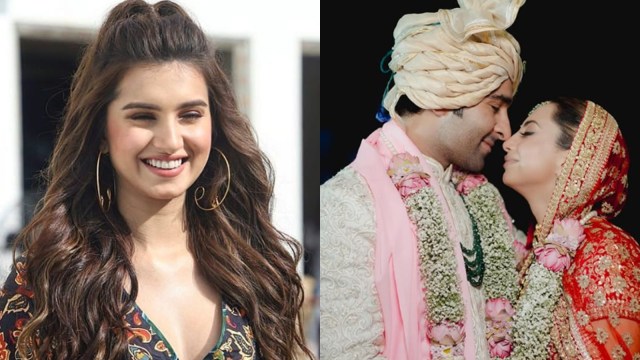📣 For more lifestyle news, click here to join our WhatsApp Channel and also follow us on Instagram
‘If he can’t say it to his mother…’: Tara Sutaria’s mom Tina shares cryptic post on disrespect in relationships after Aadar Jain’s viral comment; impact of casual remarks
“I have always loved her and I have always wanted to be with her. So she sent me on this long journey of 20 years through time-pass...," Aadar Jain said.
 While Aadar Jain's ex-girlfriend, Tara Sutaria, has not reacted to the comment, her mother, Tina Sutaria, shared a cryptic post on Instagram. (Source: Instagram/@
tarasutaria.universe and @aadarjain)
While Aadar Jain's ex-girlfriend, Tara Sutaria, has not reacted to the comment, her mother, Tina Sutaria, shared a cryptic post on Instagram. (Source: Instagram/@
tarasutaria.universe and @aadarjain)Aadar Jain’s wedding celebrations took an unexpected turn online after a video from his mehendi ceremony went viral. In the clip, the actor spoke about his love for his now-wife, Alekha Advani, but also made a statement about his past relationships that caught everyone’s attention.
He said, “I have always loved her and I have always wanted to be with her. So she sent me on this long journey of 20 years through time-pass. It was worth the wait because I get to marry this beautiful, beautiful woman, who looks like a dream. I love you, and it was worth the wait.”
While Aadar’s ex-girlfriend, Tara Sutaria, has not reacted to the comment, her mother, Tina Sutaria, shared a cryptic post on Instagram. She shared a pointed message, stating, “If your boyfriend/husband ever says anything disrespectful to you, tell him to write it down on a piece of paper, get in his car, drive and deliver it to his mother, or simply hand it to his daughter. If he can’t say it to his mother or doesn’t want another man to one day say it to his daughter, he shouldn’t be saying it to you.”
What is the emotional impact of such casual remarks on partners?
According to existential psychotherapist Gurleen Baruah, casual remarks can carry unintended weight. Regarding Aadar Jain’s comment, Baruah explains that such statements are often dissected, leading to speculation about personal relationships. However, their emotional impact depends on the individual.
“For someone with a healthy sense of self-worth, such remarks may sting momentarily but won’t fundamentally shake their confidence,” she says. However, those already struggling with self-doubt may find such comments reinforcing insecurities. Beyond personal effects, these remarks raise questions about respect and relational ethics, reflecting how people frame past relationships. “Ultimately, how much power such words hold is a personal choice. No one can control what another person says, but they can control how much they internalise it,” she adds.’
 Tina Sutaria shared a cryptic post (Source: Instagram/Tina Sutaria)
Tina Sutaria shared a cryptic post (Source: Instagram/Tina Sutaria)
Holding partners accountable for their words
Accountability in discussing past relationships is crucial, as language shapes perception. “Dismissing a past relationship as ‘time pass’ may seem casual, but it can signal an avoidance of emotional responsibility,” says Baruah. How someone speaks about an ex reveals their emotional maturity and relational patterns. While casual remarks shouldn’t be overanalysed, encouraging thoughtfulness fosters respect and closure.
Responding to disrespectful comments with grace
Baruah asserts, “Navigating disrespectful comments about past relationships without engaging in public confrontation requires emotional regulation, self-awareness, and a focus on personal boundaries. The key is recognising that while you can’t control what someone says, you can control how you respond. Instead of reacting impulsively or engaging in a public back-and-forth, it helps to detach from the need for external validation and assess whether the comment truly reflects your worth or if it says more about the speaker’s emotional maturity.”
She adds that a thoughtful approach is to address it privately, expressing that while the relationship may have ended, reducing it to something dismissive feels unnecessary or hurtful. If direct conversation isn’t possible or productive, the best response is to live in a way that reflects your values — demonstrating grace, confidence, and the ability to move forward without being defined by someone else’s words. When rooted in self-respect rather than avoidance, silence can often be the most dignified response.
📣 For more lifestyle news, click here to join our WhatsApp Channel and also follow us on Instagram



- 01
- 02
- 03
- 04
- 05
























